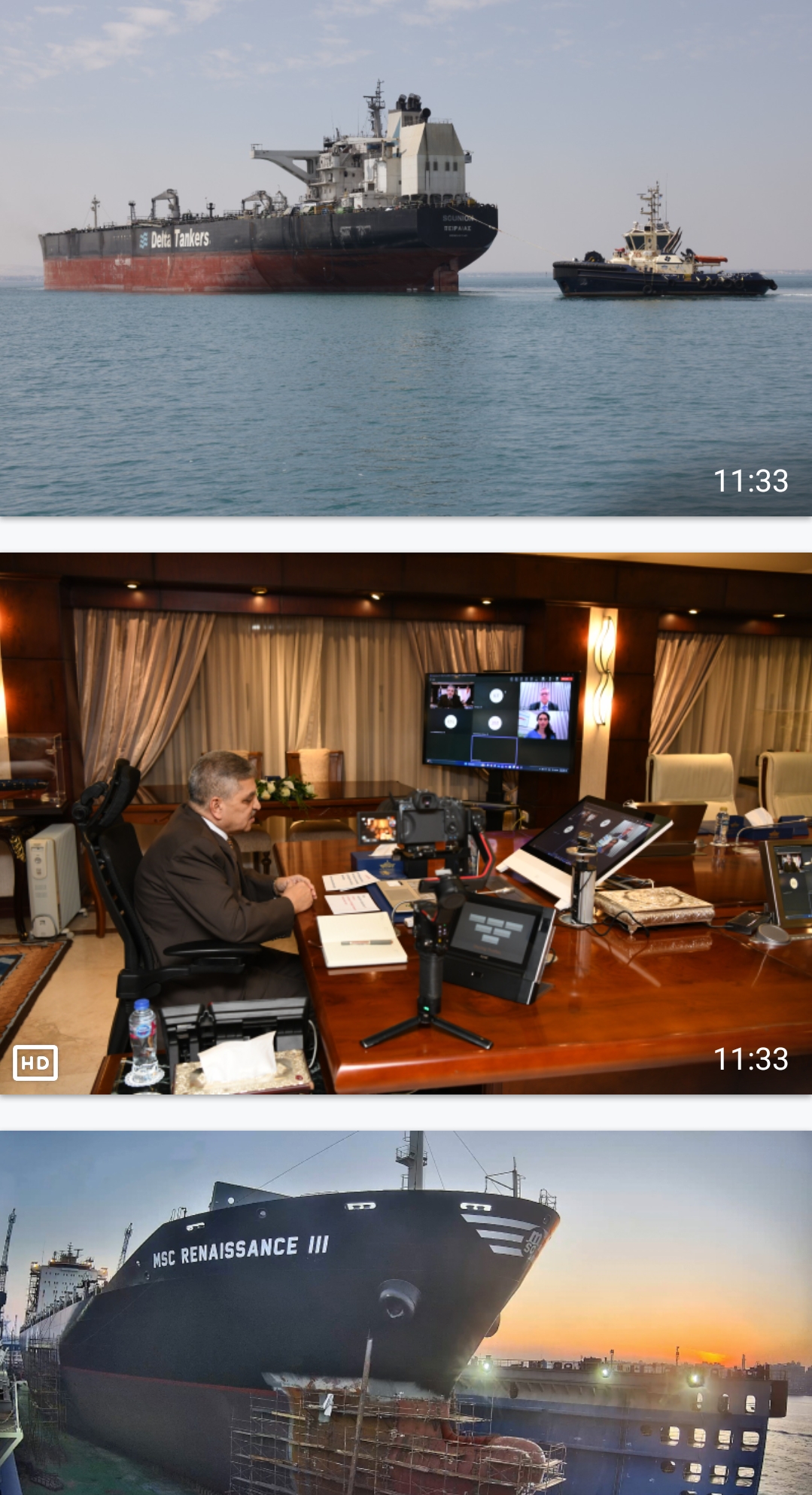
Ashraf AboArafe
The current challenges remain temporary… and the Canal continues to implement its strategy to develop the waterway and its maritime services.
Major shipping lines have confirmed their return to transiting the Suez Canal once the situation in the region stabilizes.
Half of the EU’s fuel shipments in March transited the Suez Canal during the truce period.
166 ships have rerouted their voyages to transit the Suez Canal instead of the Cape of Good Hope route since last February.
The crisis has demonstrated the Suez Canal’s ability to respond flexibly, providing distinguished services in both normal and emergency situations.
In light of the developments in the Red Sea region, the Suez Canal Authority affirms its commitment to continuing its efforts to achieve continuous and effective communication with all its customers and to build on the strategic relationship it maintains with major shipping lines, international shipping chambers, and influential organizations in the international maritime community.
These efforts are clearly demonstrated by holding direct, periodic meetings with numerous influential figures in the international maritime community, most notably the Secretary-General of the International Maritime Organization, the President of the International Chamber of Shipping, CEOs of major shipping lines, and representatives of shipping agencies. These meetings aim to consult on the geopolitical and security challenges facing the region and discuss their implications for the sustainability of global supply chains.
Over the past period, these efforts have yielded numerous successes and enhanced cooperation with partners and customers in several areas, including increasing the investment portfolio of several shipping lines in Egypt. Most notable among these is the Maersk Group, which has increased its investments in East Port Said and invested in the ship scrapping project at Damietta Port, reflecting the pivotal role of the Suez Canal in supporting the group’s activities in Egypt.
The Maersk Group has also been keen to coordinate jointly to emphasize its interest in positioning the Suez Canal as one of the main operational routes of the Gemini (Future Network) alliance, which brings together Maersk and the German group Hapag Lloyd, which began operations last February. Discussions are also ongoing regarding the group’s navigation policies and future plans to increase the transit rates of its vessels through the Suez Canal once the situation in the Red Sea region has fully stabilized.
Cooperation with major shipping lines is not limited to this area, but has extended to include several areas, including training. Last year, a joint cooperation agreement was signed with Maersk Training to organize advanced training programs for Authority employees in leadership and crisis management. Meanwhile, the Suez Canal Authority, through its Maritime Training and Simulation Academy, provides advanced training programs for ship captains from various shipping lines on safe passage through the Suez Canal.
The interest of major shipping lines in maintaining their strategic relationship with the Suez Canal is evident in statements made by their officials, including those by Mr. Søren Toft, CEO of MSC Shipping Line, regarding his preference for sailing around the Cape of Good Hope due to the lack of essential maritime services. He also expressed his readiness to resume transiting the Suez Canal as soon as full stability returns to the region.
This aligns with statements made by many influential figures in the international maritime community, who emphasize the Canal’s vital role and importance for the sustainability of global supply chains. Mr. Arsenio Dominguez, Secretary-General of the International Maritime Organization (IMO), stated that the Suez Canal is an indispensable shipping lane, expressing the organization’s support for promoting navigation through the Suez Canal, given its reduction in harmful carbon emissions and ensuring a sustainable working environment for seafarers.
Statements by Mr. Gérard Mestrallet, the French President’s Special Envoy, revealed that the India-Middle East-Europe Economic Corridor (IMEC) will not compete with the Suez Canal, given the clear difference in the trade capacity of the new corridor currently under construction. This corridor relies on maritime transport in some phases, in addition to rail transport.
Reports from international shipping institutions have reinforced the importance of the Suez Canal for the movement of oil imports to Europe, according to the Kepler analysis firm. Data from the Kepler analysis firm revealed that half of the European Union’s fuel shipments arrived through the Suez Canal during March, during a period of relative calm and the beginning of the return of stability during the truce. This confirms the interest of major shipping companies in resuming transit through the Suez Canal once stability returns to the region.
Canal navigation statistics also recorded 166 ships adjusting their routes to transit the Suez Canal instead of the Cape of Good Hope route since the beginning of February, a clear indication of the impact of the situation in the Red Sea region on ship transit rates.
Prior to the escalation of security tensions in the region, the Suez Canal’s navigation statistics during 2023 set new and unprecedented records in the canal’s history. The Canal achieved the highest annual transit rate of 26,434 vessels, and the highest annual net tonnage of 1.6 billion tons. This record also resulted in the highest annual revenue of $10.3 billion, surpassing all previous records.
Despite the escalating events and increasing challenges, the Suez Canal has not ceased providing its navigation and maritime services since the outbreak of the crisis. Rather, it has continued its efforts to support comprehensive and integrated development through ongoing waterway development projects, in parallel with its efforts to improve navigation services and add a package of new navigation services that were not previously provided.
Coinciding with the fourth anniversary of the successful refloating of the container ship “Ever Given,” which was accomplished thanks to the Authority’s technical and human capabilities and the support of its maritime fleet with new tugs, the Authority celebrates the completion and operation of the Southern Sector Development Project. This project has increased the Canal’s navigational safety factor and reduced the effects of water and air currents on transiting vessels. It has also increased the Canal’s capacity to handle special transit operations, such as the passage of the 90-meter-wide “DOURADO” floating dock, which would not have been possible had it not been for the completion of the Canal expansion project as part of the Southern Sector Development Project. The maximum width allowed for transiting the Canal prior to the expansion project was 70 meters, according to the Navigation Regulations. As events unfold, the Suez Canal’s ability to respond flexibly and positively to the demands of the crisis and meet customer requirements is revealed. It has also enhanced its navigation services and introduced a package of new services previously unavailable. These services include the Port Said Maritime Arsenal providing maintenance and repair services to two vessels belonging to the MSC Shipping Line. Furthermore, the Suez Maritime Arsenal Company, affiliated with the Authority, successfully provided urgent maintenance and repair services to the Greek bulk carrier “ZOGRAFIA” after it was attacked in the Red Sea. It also provided maritime rescue services to unload the cargo of the Greek oil tanker SOUNION, which was attacked in the Red Sea. The necessary measures and preparations were then taken to safely tow it through the Suez Canal.
These challenges serve to demonstrate the Canal’s leadership and its unparalleled leadership, a channel of prosperity and a symbol of defiance and resilience, unrivaled by any competitor, and unchallenged by any alternative route. Steadfast, rising above change and circumstances, it documents for history the genius of its place and time, and the capabilities of the Egyptians.
The Suez Canal Authority urges the media to exercise accuracy, adhere to objectivity, and refrain from publishing any false data or analyses that could sow confusion, cast doubt on the capabilities and potential of the world’s most important maritime facility, or harm its reputation and global standing. It emphasizes the importance of obtaining accurate information from the Authority’s official sources.
Suez Canal Authority Spokesperson
George Safwat

 to all..
to all.. 


